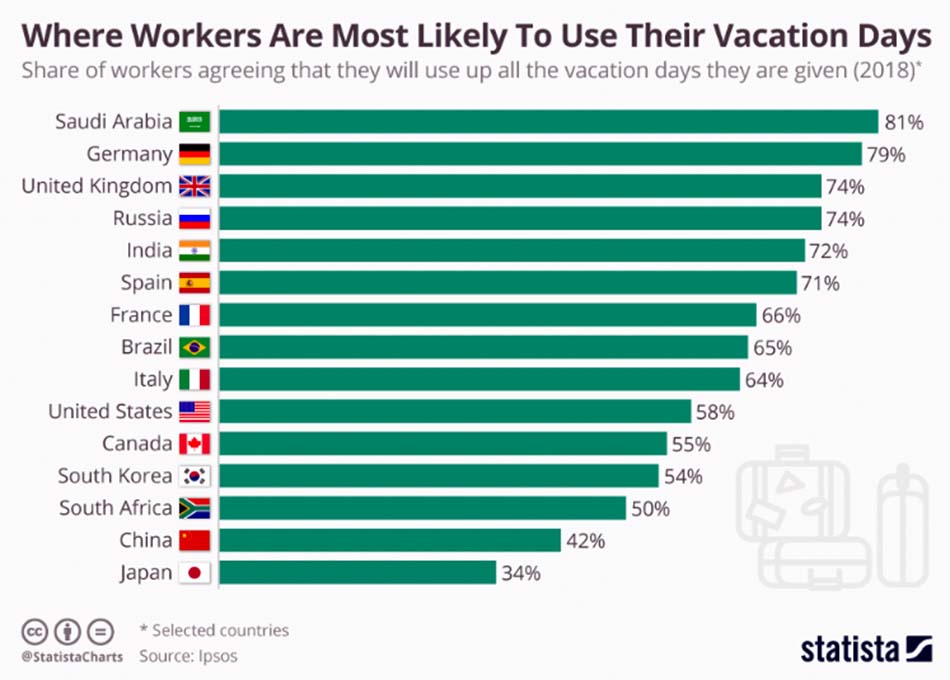Unlimited PTO - Which companies offer it, and is it even worth it?
A ton of companies are now offering their employees "unlimited paid time off", but what does "unlimited" PTO actually mean in practise and how does it compare with "flexible PTO"?

Unlimited paid time off... seems to good to be true? In this post we'll do a deep dive on this new employee benefits by discussing what it actually means, how it compares with flexible paid time off as well as listing some companies which offer this benefit. But first, let's cover the basics...
How does Unlimited PTO work?
If a company offers unlimited paid time off (PTO), it means that employees can "take as much time off as and when they need it, whilst also getting paid for their time off".
In practise however, there are some unwritten rules about unlimited PTO. For example, you can't book the whole year off and expect to get away with it. Unlimited PTO should probably be renamed:
Unlimited paid time off, within reason.
Most unlimited PTO policies require that employees must avoid "abusing the system by taking time off that negatively impacts their job and the company." As long as you are getting the work done and hitting your deadlines, there shouldn't be an issue about using your unlimited PTO".
Checkr is one company which offers this perk and they describe it as:
Team members can take the time they need, when they need it - there is no need to ask for permission or keep track of days taken.
So a large part of unlimited PTO is flexibility about when time off can be booked, and not just how much time can be taken off. At Leena the process is as follows:
The leave application process is one that is based on an approval system. Our employees formally email their managers about the required number of days they intend to go on leave and the manager, or the HR personnel sends their approval as confirmation. We try not to put a bracket on our employees in the context of taking a leave of absence. This is because we want to eliminate the added stress of taking vacation days or carrying them forward to the next year, or even rationing their vacation days and planning around it. We have given our employees the flexibility to take leaves whenever they require, but at the same time they also need to be accountable for their work and take complete ownership of it. I have seen our employees take a maximum of 10-15 days of paid time offs at a stretch.
Difference between Flexible PTO and Unlimited PTO
Flexible PTO means that you are able to easily take time off when you want to, but it's up to your manager or the company to decide how much time you can take. Differing slightly from unlimited PTO, flexible PTO adds a range for how many days of holiday they can take.
Flexible paid time off could be seen as the "traditional" model offered by most companies. It gives them an allowance of vacation days per year and gives them flexibility on when they can book time off. Typically in practise, employees aren't allowed to book more than 2 weeks off at one time however.
And how time can you take off in total for any given year? Well, the maximum typical vacation allowance varies from country to country:
| Country | Public holidays | Minimum Paid Days Vacation | Total |
|---|---|---|---|
| USA | 10 | 0 | 10 |
| UK | 8-10 | 20 | 28-30 |
| France | 11 | 25-37 | 36-48 |
| Germany | 10 | 20 | 30 |
| Australia | 10 | 20 | 30 |
| China | 11 | 5/10/15 | 16-26 |
| India | 10 | 25 | 35 |
That's assuming the employee even uses their allowance:
Pros of Unlimited PTO
Understandably unlimited PTO is a controversial topic as no PTO can truly be "unlimited" otherwise most people wouldn't come into the office! So firstly, let's consider the benefits of unlimited PTO...
1.It creates a value driven culture
Unlimited PTO promotes a value driven environment by encouraging employees to take time off "if they get their work down". Instead of measuring the amount of hours we work, an unlimited PTO policy encourages employees to focus on getting their work done, rather than measuring the number of hours they have worked.
As Todd Ramlin (Manager at Cable Compare) puts it:
We don’t pay people to spend set amounts of time working, we pay them to get their job done.
2. It promotes flexibility
On the face of it, an unlimited policy puts power in the employees hands. Instead of being constricted by a set number of days to take off each year, an unlimited policy allows staff to take time off as in when they need it. During some years, an employee may need to take off more time than they usual do (e.g. if they experience burnout, illness etc) and other years they may take slightly less.
Unlimited PTO can be beneficial in that it allows employees more flexibility and freedom when it comes to taking time off. This can lead to higher levels of job satisfaction and retention, as employees feel trusted and valued. Additionally, unlimited PTO can also be a good recruiting tool, as it can attract top talent who place a high value on work-life balance. - Morshed Alam (Savvy Programmer)
Would you like a 4 day work week?
3. It benefits employees when they are ill or burnt out
Clearly one of the biggest advantages is that is allows staff to "take off as much time, when they need it". This is an especially great benefit for employees who become ill / burnt out or require companionate extended leave.
At Checkr wee feel that it allows our team members to have a better work/life balance and also encourages them to take the time they need when they are ill or dealing with a personal issue. At our company team members can take the time they need, when they need it - there is no need to ask for permission or keep track of days taken. - Linda Shaffer (Checkr)
4. It's great for recruitment and retention
There's no denying that one of the major reasons companies employee an unlimited PTO policy is to help with attracting candidates.
An "unlimited PTO" policy simply has a better ring to it than "2 weeks paid time off per year". And given it's a great tool to attract, it's also a great tool to retain candidates.
5. It prevents the rush to take vacation allowance before the year ends
With a traditional vacation policy, it is common for employees to rush to use up all their vacation allowance at the end of the year.
This often means that 50% of the team is off for much of December! With a more flexible unlimited vacation policy, this situation doesn't happen.
6. Productivity can improve
It has been shown that the more rested we are, the more productive we are. That's why a ton of companies are even switching to a 4 day work week i.e. 20% less time at 100% pay.
In many cases output isn't effected despite working shorter working hours due to a phenomenon known as "Parkinson's Law" i.e. work expands to fill the amount of time allocated for it's completion.
Therefore, by offering more time off, employees should be better rested and perform better in their role.
Cons of Unlimited PTO
So there are clearly advantages in offering an unlimited PTO policy, but there are also some disadvantages you should be aware of...
1. Potential for abuse
Clearly one of the major disadvantages of the policy is that is could be abused. Some team members could book significantly more time off than is required just because the policy exists. Therefore, an unlimited PTO policy can be difficult to police and requires the goodwill of both the employer and the employee.
As Alex Wang from Ember Fund puts it:
While offering unlimited PTO is a great way to keep employees refreshed, engaged, and productive, the system does have the potential for abuse. If one or more of your employees takes excessive time off, your team may find themselves with a heavier workload as they take on more work in their absence.
2. It could have an impact on the business
Given that an unlimited vacation policy is so flexible, it could have a negative effect on the business. For example, if 50%+ of a team decide to take a long vacation at the same time, there may be limited resources to cover the work, and projects may fall behind schedule as a result.
In practise this usually means that at least one person must be available for any given position i.e. multiple members of the same team cannot take time off at the same time.
3. Some people will take (significantly) less time off than others
A major disadvantage of unlimited PTO is that is preys on human psychology. For example, a louder / more confident member of the team is probably more likely to more time off than their quieter colleagues.
Another problematic scenario is if the manager of the team rarely takes time off themselves. In this situation a guilt culture may form i.e. team members may feel bad about taking time off if it isn't normalised within the team.
4. Legal issues
Another issue with an unlimited PTO policy is that employment law varies from state to state and country to country, which can often make it difficult to implement.
Dr Pranay Parikh of Ascent Equity Group said that:
We implemented unlimited PTO but it was a little bit difficult due to employment law in some states (we are a remote company) requiring us to put an actual number in there. So instead of unlimited, we put a large number of days available to each employee. We haven't had many people take PTO since we implemented this strategy.
Unlimited PTO Policy Example
So maybe weighing up the pros and cons of an ultimate PTO policy, you may be tempted to implement it at your company. In this case, here is a sample policy you could use:
At [COMPANY_NAME] we don't set a limit on the amount of time that an employee can take off. We put the power in employees hands. Book off as much time you need to recharge for whenever you need it.
All that we ask is that you don't abuse this benefit and that you prioritise finishing your work before booking a vacation. Our unlimited PTO policy should not compromise your performance in the workplace. To reduce disruption, we ask that employees don't book more than [X] weeks time off at a given time and that any relevant work is delegated during your absence.
To make sure you have enough time to rest, we [RECOMMEND or ENFORCE] that employees take a minimum of [X] days off per year to help them rest and avoid burnout.
When booking time off, employees should notify their supervisor at least [X] weeks before. We should also note that our policy doesn't interfere with our parental leave policy.
Companies with Unlimited PTO
Or maybe you'd like to work at a company with an unlimited PTO policy? Well at 4 day week, many of our companies have an unlimited PTO policy. Oh and they all work a 4 day work week (32hs)... yes, you read that right.
So here is a list of 35 remote 4 day week companies who offer unlimited PTO:
